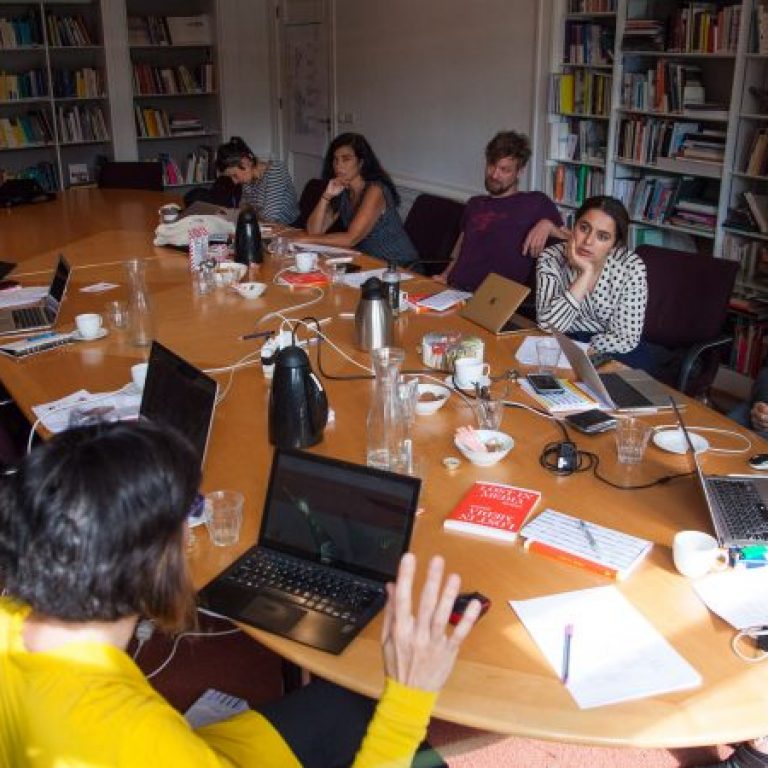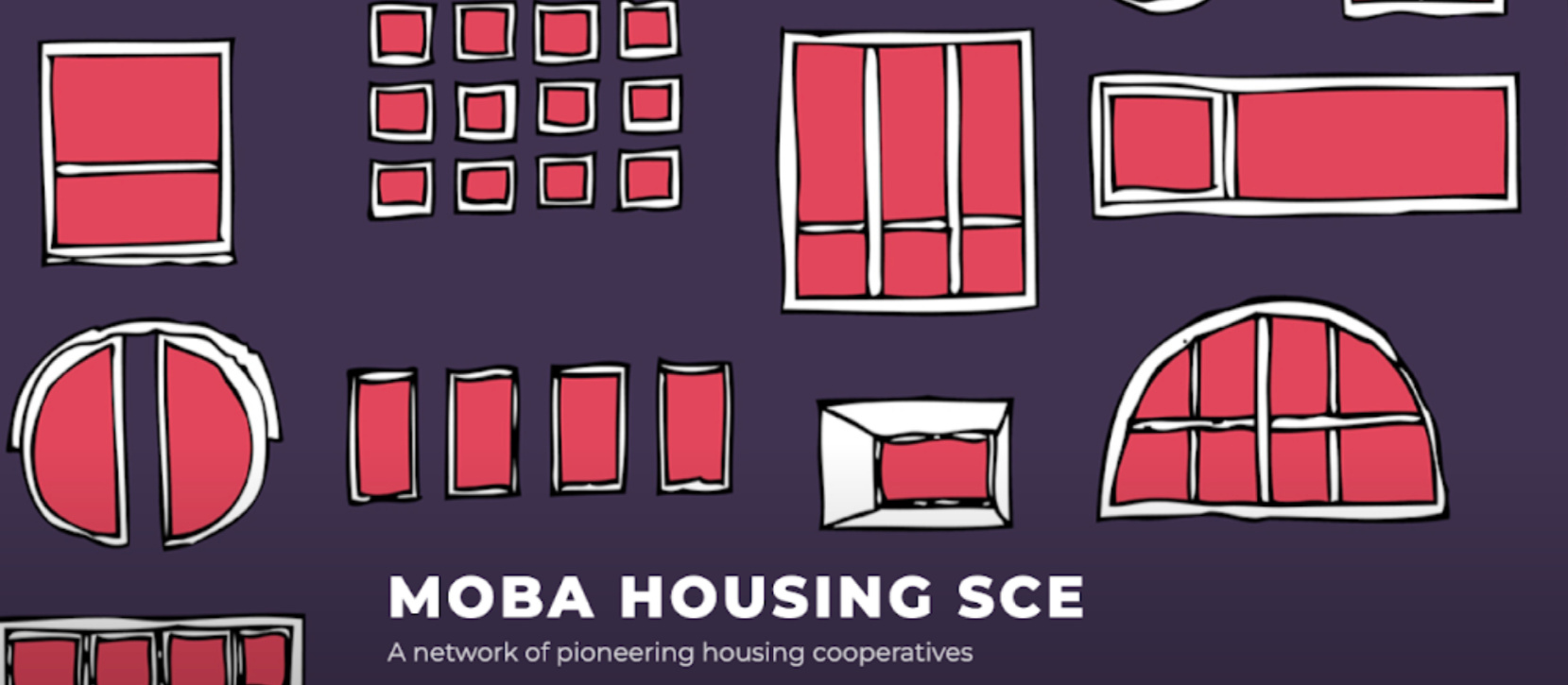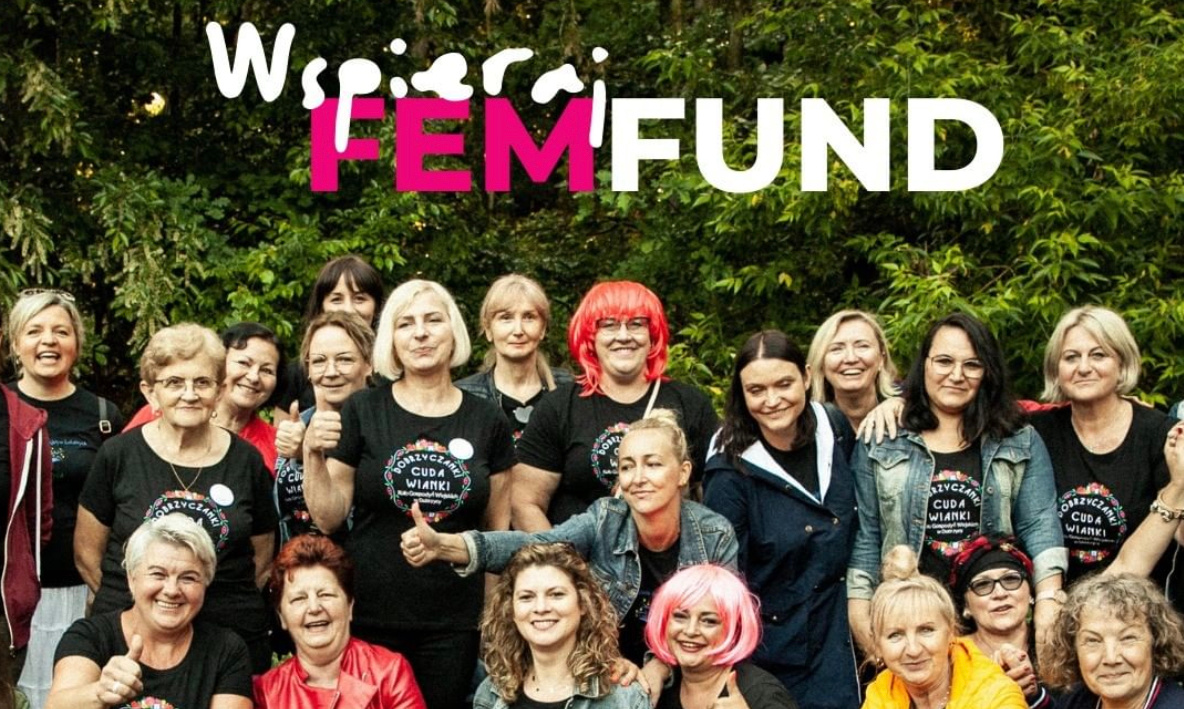Strategies to push participatory grantmaking forward.
A Masterplan for FundAction!
“The perfect is the enemy of the good”
On the 10th and 11th of September 2019, the FundAction Facilitation Group held its in-person meeting in Amsterdam, at the premises of the European Cultural Foundation (ECF). They were two days full of strategizing for FundAction, but also of simply syncing with each other. For some FG members it was even the first occasion to see each other in person; and although we all felt the urge to get on zoom to meet on Wednesday (the usual FG meeting day) we resisted, because this time we got to work side by side in the same room.
Besides the meetings serving a handover purpose between outgoing and new FG members, the objective of the meetings was also to design a timeline and budget regarding main activities to be carried out in a horizon of 3 years and beyond.
The Venue of the meetings was not so interesting, according to Menno Wijs, outgoing FA member and Funders representative, in comparison to Magacin, Belgrade, where the previous FG in-person meeting took place- as basically much less poop was needed to clean out. In fact, the ECF building is located in the second most expensive area of Amsterdam (in between the historical and business district) and it was bought by the foundation in the 50s. As expected, ECF was very welcoming and offered FundAction its library to meet in, and right off the bat we got some presents: The awesome Lost in Media publication which they published on migrant perspectives in the public sphere, but also the brochure Magacin-a model for a self-organized cultural centre, which our colleague Luka brought with him.
A lot happened since the Assembly…
Updates were given by everyone regarding the undertakings of the FG since the Assembly in May. So there was the report from the Annual Assembly, as well as two learnings pieces from outgoing FG members, regarding the latest Facilitation Group renewal process and the other more regarding the FundAction process at large; the four new FG members got used to the workflow and took responsibilities in specific and new areas (in July the FG fell one person short, due to one member suddenly stepping down). Also different tools were developed, as an internal FG calendar; a sheet to keep track of communications with FA members, a new grant communication document on how to upload documentation on the platform, and a survey regarding tools for the FA community (soon to be sent out!). Also, and in order to increase transparency and member involvement, the FG started producing updates in the platform after every meeting. And last but not least, in August, the FA Fundraising Working Group issued a funding proposal to the OSF Public Health programme.
With the memory of this years’ Annual Assembly in mind, we set out for developing a Masterplan that could serve the FA members community and its work well into the future.
The Masterplan!
Activities, timeline, budget – such was the concrete framing into which the brainstorming following the updates gradually took form. Below a listing of some of the main results, which have been set into a timeline and which have all received a budget :
1.Community Guidelines
Following a need identified also during the 2019 Assembly, FA wants to embark on a facilitated but foremost participatory process around the elaboration of FA community guidelines. The community guidelines would be clarifying on what FA is, as well as on how the FA community hopes to work together, on what it means to be an FA member. Different texts already exist on this, however the guidelines would bring these together as also work out any unanswered issues. A call for a consultant from among the FA community will soon follow, whose task it will be to facilitate the participatory process towards the guidelines, which are then meant to be ready by the time of the next Assembly (more details below on that!)
It feels very exciting that the time has now come for FA to embark in a participatory manner on the elaboration of these guidelines, which will be making explicit what collectively stands at the core of FA, and which will be informing different working areas of F
2.Assembly 2020 and beyond
Both the previous Annual Assemblies were held in May in La Bergerie, Villarceaux, France. So, this time, we discussed whether this could be improved in terms of timing. In particular, in relation to the moment when the FG members who have completed their 2 years term step out, and new FG members set in. This used to coincide with the time of the Annual Assembly. However, it was thought through that it is actually very good to prepare the Assembly, live it through together, and afterwards still work on with a similarly composed FG. A possibility would then be, to have the “new FG” starting in June, whilst allowing for the outgoing FA members to still work on until the Assembly, which would be held later, in October. This would also allow for a much better guidance for the new FG members, at the start of their mandate.
Also the venue was discussed, meaning to explore the option of holding of the assembly at another venue than La Bergerie. It would be great if the Assembly could be held in a place where the coming together of a larger group of activists could, for instance, reinforce a local struggle, and lead to mutual exchange. However, this idea could increase the costs of organizing the Assembly for FundAction, since La Bergerie has been offered to FundAction for free.
3.Resist
Also the Resist grant round got a good push forward during the FG meeting, in the form of a pilot envisioned for 3 months in 2020. This pilot wants to support urgent needs that arise in the period, whilst helping FA design an ongoing grant which would function as a safety net/ support mechanism adapted for what we learn through the process. The grant would also be a part of the general outreach scheme of Fundaction, as it is imagined more grassroot groups will apply for the grant (see below). FA Members can apply for their organizations’ urgent and unexpected needs, but can also do so on behalf of other grassroots groups (outside FundAction) – under the same grant conditions.
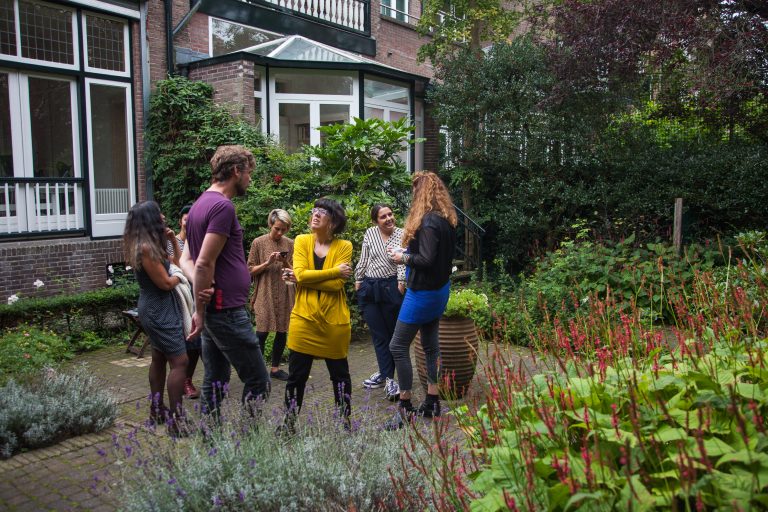
4.Thematic rounds
This idea to have grant rounds on certain themes has been parked for a while, but a recent funding opportunity re-opened this debate in the FG. Sometimes the fear with thematic grant rounds can be, that they push for the framing of a project according to the parameters set by the funder. The FA discussions led to thinking differently about this:
- It can allow us to think systemically and cross-disciplinarily about a particular issue.
- It can allow us to fund things that are coming up from the membership that may not otherwise get support from the normal grant calls, or from conventional funding streams.
- It allows normal foundations (that may struggle to give money to a general fund) to engage with our participatory processes. This allows them to learn and fund beyond their regular outreach, and also gives FundAction some operating support.
As mentioned above, members of the Fundraising Work Group have applied for a grant on the topic of health (broadly interpreted) and if the funding materializes, FA will open a debate among the members on how to define and design this round, making this a participatory learning opportunity. Fingers crossed!
5.Communication
The Communication Working Group will need to develop its guidelines, integrated into the FA Community Guidelines mentioned above. Apart from the FA public website and twitter through which non-members can learn about FA, a new tool was proposed and described: a podcast! The FG will initiate a pilot episode of a podcast made by FA members about FA, its processes, its learnings and the grassroots work of their members. It will be further developed within the Community Building Working Group. It fulfills both the need of FA as a whole to present itself to the world, and of the individual (and new) members- to get to know each other in more interesting detail than the FA platform profiles allow.
6.Outreach
FA wants to keep a balance between its available resources and the size of its community, but also deal with areas of underrepresentation in FA. During the meeting, the discussion around Outreach took at hand the proposal made during the Assembly, whilst taking into consideration the current development phase of FA, one in which importantly Community Guidelines are developed in order to bring more clarity on FA and on what its membership mean for us.
Therefore, it was discussed that the upcoming Resist grant in 2020 will be a process through which new members will be invited into FA (as it is assumed these will be more grassroot groups), after which an assessment will be made regarding their participation in FA. The community guidelines will also help this assessment. In 2021 further research would then be commissioned on underrepresented themes, groups and areas, after which at some point in presumably 2022 an Outreach Committee would be established to respond to the recommendations coming out of the research. With the whole of this process we would be heading towards a more diverse FA platform of activists!
7.The short and long term future of the FA facilitation group
The FG renews itself for 50% every year, making it so that each member works in the FG for a maximum of 2 years. Following recent events – the last FG renewal process, as well as due to stepping out of one member – there is a need to redesign the process of the recruiting of new FG members, as well as to determine principles on the basis of which a new member can be stepping in, in case this is needed sometime in the midst of a term.
For the latter, a proposal was developed to finding a temporary FG member through a bridging call. This FG Bridging Call is active from 20 September to 6 October and consists of self-nomination, so we invite you to have a look and dare to step-in and join the FG!
8.Evaluation
FA had a first evaluation conducted by Sameer Padania, which was finalised at the end of 2018. The evaluation looked at what is new about FA, about how its values were implemented, on the role and involvement of the donors in FA, and addressed also respondents’ opinions on the FG.
The next evaluation of FA is wanted to have a focus on the impact of FA. Final reports of granted projects would be taken at hand, and conclusions would be drawn on issues such as how many people the projects reached, and what change was brought forth. The impact will be considered also with regards to the philanthropic sector (if and how FA has brought some changes by its participatory grant-making), and with regards to its impact in Europe.
Yet another angle was brought forward for the evaluation, namely to list/map in some way or another all the projects which have been presented during FA grant rounds – one could even think of the making of an annual FA yearbook. Doing this would allow to see what is brought to the FA open space, to a space which is not heavily designed by any funders, leading us to assume projects based on real needs brought to the forefront. This also allows to see in which direction people’s interests and needs are moving.
***
In the evening, we got the chance to meet and have dinner with local activists at the Volkshotel. It was quite a treat to share experience on their diverse range of work, from organizations like Vote for Women -that empowers citizens to have more women enter the political scene to We Are Here -a collective of refugees rendered homeless in The Netherlands due to asylum gap, but motivated to be vocal and visible in society. We also had a member from the Commons Network, about which we could learn more.
The second day was a chance to have a fresh look at everything we planned, and to make holistic decisions. It feels good that due to our planning work FA will be able to benefit from a yearly grant calendar, well- known in advance, which the FG will present at the start of 2020 for the whole year! Of course the overall wish is to be able to give out more grants, but this depends on our collective work and the future development of FundAction. With regards to the latter, also new levels of interaction with funders/donors were discussed, like FA consulting with them towards participatory practices, donors-inclusive events of the FA community, and comprehensive strategies for funding and communication.
For the near future, we’re looking forward to a new FG member joining us to help shoulder all the brave initiatives we set out for, to get the FA activist community more on its feet and better acquainted internally as well as more aware of its collective power in achieving systemic change goals in the world of grant-making and in society!
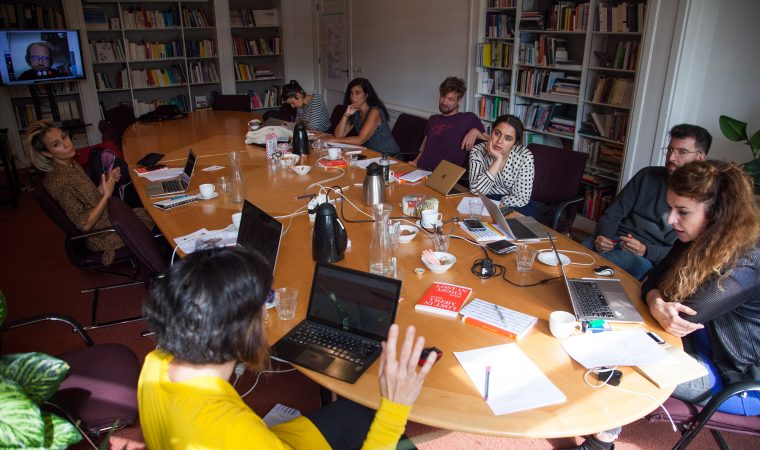
This blogpost was written by Brindusa Birhala and Ruby van der Wekken, both members of the current FG. Photo’s Luka Knezevic-Strika and Brindusa.

